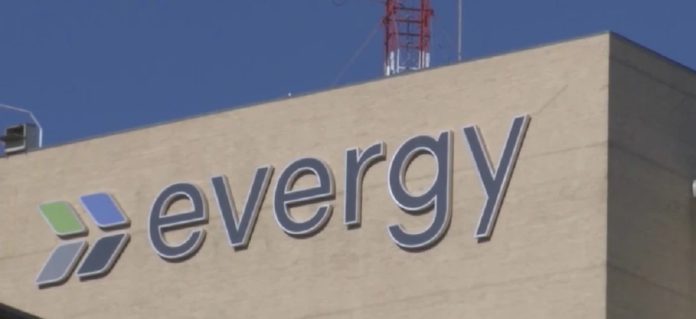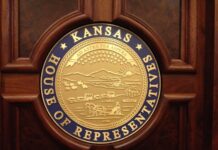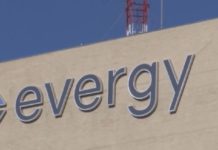Evergy has reached a deal on a bill that it says will help attract investor capital needed to meet the demands of new economic development.
The House utilities committee on Tuesday signed off on a compromise that eased the strong opposition it faced when it was first introduced.
The bill makes changes in the regulatory framework that will generate revenue for Evergy to make certain investments in the grid to accommodate new development.
“This was a bad bill when it was filed Feb. 6 – a very bad bill that didn’t have adequate consumer protections,” said Paul Snider, lobbyist for Kansans for Lower Electric Rates, a coalition made up of heavy power users, midsized businesses and some school districts.
“Just the balance of what was good for Evergy and good for consumers was not there,” Snider told the House utilities committee Tuesday. “It has gone a tremendous amount in the right direction.”
Snider’s group moved to “neutral” – others moved to proponents – after changes were made to contain costs, preserved regulators’ ability to set rates and didn’t pass on the cost of discounted economic development rates to other customers.
“We are encouraged at the possibility of passing this legislation this year,” said Chuck Caisley, chief customer officer for Evergy.

“To have compromise language that has gotten us to a point where there’s little to no opposition and a significant amount of support puts us in a good position to move this legislation, but we’re 25% of the way through the process,” he said.
“There’s a lot of work left to be done,” he said.
The staff from the Kansas Corporation Commission didn’t oppose the legislation after it was revised, calling the bill a “well-crafted” piece of legislation that will give lawmakers a clear policy decision.
“It started out as what I think was kind of a disaster of a bill,” said Republican state Rep. Leo Delperdang, chair of the House utilities committee.
Delperdang said he insisted from the outset that parts of the bill that he believed would significantly raise electric rates be removed or he wouldn’t work the legislation.
Delperdang said he hopes the bill would space out the time between rate cases.

“Without this, I think we would be seeing rate cases every year,” he said. “I’m hoping with it maybe every two to three years.”
Notably, the compromise eliminates a controversial section that would have kept regulators from setting the return on equity – the profit opportunity component of utility rates – that balances the interests of ratepayers and shareholders.
Regulators said that section of the bill would have required the Kansas Corporation Commission to follow the utility’s choice to use an average of the fully litigated return on equity results from other states over the last 12 months.
The KCC staff said to its knowledge, a bill that allow a regulated utility to choose its own capital structure for ratemaking purposes did not exist anywhere in the country.
The bill also would have removed regulators’ ability to decide a capital structure for ratemaking purposes.
As part of agreement, those issues will be handled in a proceeding before the KCC because of their complex nature.
The bill leaves in place a provision that would allow Evergy to defer 90% of the depreciation it incurs between rate cases for investments in the electrical grid and existing power-generation plants.
Those costs would be deferred in a special regulatory account until the next rate case, after which they would be recovered over 20 years.
This section of the bill is limited to existing power generation and distribution as well as information technology and cybersecurity investments.
Further, the bill caps the annual retail rate at 1.5% on investments covered by the legislation.
Justin Grady, deputy director of the KCC’s utilities division, said the actual rate impact of the bill during its first six years will be less than $18 million a year for Evergy’s central territory and less than $6 million a year for the Kansas City area.
When Grady testified on the bill in its original form last month, he estimated that it would could have cost Evergy ratepayers in Kansas more than $60 million a year if it had been applied to the rate case decided last year.
Grady said the bill’s effect on rates depends on how often Evergy files rate cases, but that the KCC staff does not anticipate utility hitting the 1.5% rate cap.
The bill also creates a new 10-year discounted electric rate for economic development projects 25 megawatts or larger.
For the first five years, the average discount rate will not exceed 40%, although it can range anywhere from 20% to 50% over the time frame.
For the second five years, the average discount rate will not exceed 20%, although it can range anywhere from 10% to 30% over the time frame.
As part of the compromise, the discounted rates will no longer be deferred and recovered from other customers to make Evergy whole for the discounts.
The difference between the discounted rates and the full rate will no longer be directly recovered from existing customers after a rate case under the revised legislation.
The legislation will retain a provision that allows the utility to recover interest and carrying costs for construction of a new natural gas plant through a line item added to the customer’s bill.
The company says this provision would reduce the overall cost of the project and save money. State regulators, under the new bill, can order a refund if the plant isn’t built.
The bill would sunset after six years, although the Kansas Corporation Commission could extend it another six years.
After 12 years, the proposed law would have to be extended by the Legislature.
The bill is about attracting capital investment that Evergy says is needed to build more dispatchable power generation, industry shorthand meaning a resource that can be counted on when it’s needed such as coal, nuclear and natural gas.
Company officials, however, say that it’s hard to raise capital because Kansas is considered among the worst regulatory jurisdictions in the country, along with Illinois, Maine, Connecticut and Washington, D.C.
The company is looking to build a natural gas plant that could ramp up quickly to support renewable power generation on the grid. It also would provide another source of energy at times when there is peak energy demand.
The company holds out the promise of the state bringing in new economic development as more capital flows into the state for building the infrastructure needed to serve those new businesses.
In the last three years, 47 projects have located in Evergy’s service area, bringing 12,000 jobs and $7.3 billion in investment, officials said.
The company has more than $13.5 billion in investment and projects that could move to Kansas in the next five years.
The company has signaled that the state could lose business because it takes the utility two to four years to extend service to a large manufacturer.
Evergy officials said the last time new base load power generation was constructed in central Kansas – the old Westar territory – was in 2001.
The last time a new plant was constructed in the Kansas City area was 2010, when a new coal plant was constructed in Weston, Missouri, and across the river from Leavenworth.
They point to a report recently issued by the North American Electric Reliability Corporation – known as NERC – that found the region is at an “elevated risk” of not having enough generation capacity to meet demand, especially in the winter.
The study, they said, suggests that more dispatchable energy production is needed.
There’s already a lot of wind generation in Kansas, they said, but what the region lacks is a sufficient amount of dispatchable power generation, which is decreasing.
Nuclear and coal are largely out of the question, prompting Evergy to look at a new natural gas plant, which takes four or five years to build.
Evergy officials have suggested that the gas plant would go to Missouri if Kansas doesn’t move to change the regulatory environment.
Democratic state Rep. John Carmichael of Wichita questioned how the bill would benefit the residential ratepayers.
“As I look at this bill,” Carmichael said, “I see good things for Evergy’s shareholders here. They’re going to be able to recover expenses quicker.”
“I see good things for the industrial consumers, the incentive plans if you will,” he said. “But where’s the provision in here that helps the residential ratepayers?”
Grady said if the disincentives for Evergy to spend more proactively are removed, there are benefits, although they might be hard to identify.
“What we’re talking about is additional economic development, additional reliability improvements, that’s what it would come down to,” Grady said.
















